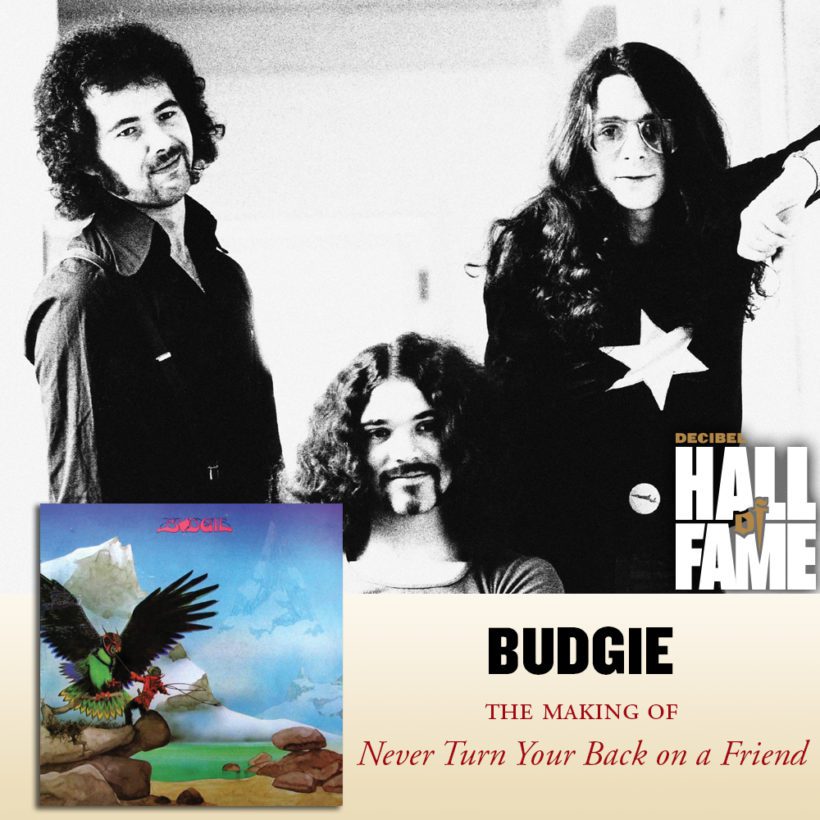
Budgie‘s influence on extreme metal, and heavy music in general, is undeniable. Known as one of the catalysts for the movement known as the NWOBHM, they were famously covered by Metallica in 1988 and influenced plenty of heavy metal’s biggest bands. It’s with great pleasure, then, that Decibel welcomes Budgie’s Never Turn Your Back on a Friend into the Decibel Hall of Fame.
You can grab a copy of Issue #167, which features a complete, 7-page feature on the making of Never Turn Your Back on a Friend, plus a cover story on Pig Destroyer and exclusive Septic Tank flexi, here. Read on for an exclusive excerpt from the story on Metallica covering “Breadfan.”
What do you make of Budgie being labeled the one of the originators of heavy metal?
Phillips: People would ask us, “What’s it like being in a heavy metal band?” I would stop them and say, “We were a rock band. A rock band.” Before rock it was underground. How do I feel about people categorizing us as starting or being a part of heavy metal? I feel so proud. It makes me want to get back out on the road. I want to give them the real Budgie experience, from the early days. It would be a real joy to play for people again. I mean, I have the Ray Phillips Budgie band. I still do play. I’m 69. I’m fit as a fiddle. I don’t look 69. I was recently stopped by the cops. They wanted to see my documents. Routine stuff, really. He came back and said, “What’s your date of birth?” I said, “1949.” He was shocked. He said, “And you look like that? How?” I said to him, “Sex, drugs and rock ‘n’ roll!” [Laughs]
Shelley: At the time, I had no idea that this would happen. We were just Budgie. When I first heard The Beatles, they were my band. They set me off. As for Metallica, we just happened to be one of their influences. That’s the way music rolls on. It can be derivative, but that’s the consequence of influences becoming more and more complicated. But it’s a pleasure to know we’ve influenced other bands. I like Metallica. I’m a bit chuffed we helped Metallica become a band. It’s kind of cool. They’re massive! Soundgarden are the same way. Iron Maiden, too. They’ve always said we were a big influence on them. Not sure I hear it, but we were. I do remember when we’d play the Marquee, this young kid would show up and eat our catering. He’d hang out with us as if he was in the band. [Laughs] I remember asking, “Who’s this kid? And why is he eating all our food?” Someone said, “Oh, he’s in some band called Samson. His name is Bruce.”
Bourge: I don’t know, really. If you listen to commercial rock when it first came out, it was very stompy and very basic. Musicians like Jeff Beck and Marc Bolan. But in Britain then you had underground bands—and they were called that at the time, too—that played blues stuff slowed down. They started to use slightly different chord structures, their lead playing became more progressive, their tones weren’t always so nice and they were using knobs normally not touched on the guitar. When I think of the bands like that I think of a band called Spooky Tooth. They used to do a song called “Evil Woman.” Luther Grosvenor was a little bit ahead of his time. He was playing notes that weren’t supposed to be played on the guitar. That lead is pretty special during the break. He was taking blues down a different road. Instead of using the usual chords—G, C, and D—he was playing A and E. It worked really well. They started to use notes and riffs that sounded new. It went from blues to fast blues to fast rock ‘n’ roll to something else. The underground bands in Britain were the main cause of it. Jeff Beck was known for playing notations that were accepted. When Jimi Hendrix came along, things went down a new road and everyone freaked out about it. He was on the other side of the bridge. Nobody could see him, but they could hear him. That’s when I figured out I could do more with riffs that aren’t generally accepted. Like semi-tones no one else was using. That’s when heavy rock emerged. Guitars became more orchestral, musical. Then, punk changed all that. It became mass murder on stage. [Laughs]
At what point did Metallica come into view?
Shelley: I heard about Metallica in the late ’80s, I think. They were quite good. The difference between that crowd and us were detuned guitars.
Phillips: I remember when we brought out “Crash Course in Brain Surgery,” Annie Nightingale of BBC Radio 1 said, “That is the worst song I’ve heard in my life.” So, fast forward to Metallica. I had Metallica fans coming up to me saying, “You wrote ‘Breadfan?’” I said, “Yeah, look on the album. It says Burke Shelley, Tony Bourge and Ray Phillips.” Same with “Crash Course.” They were amazed. Because of Metallica, Budgie suddenly became in vogue with the press. We suddenly had loads of press after Metallica came around. Then, Iron Maiden, Soundgarden and Van Halen. I mean, on Alex Van Halen’s website, he states that me, Ray Phillips, is one of the reasons he started playing drums. Lots of big things came together over the years because of Metallica.







